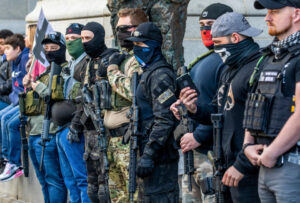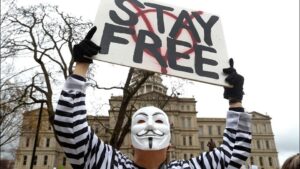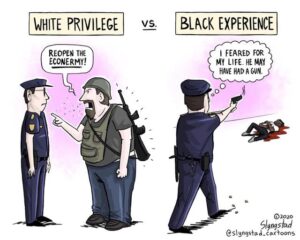Four years ago, on the eve of the 2016 U.S. presidential election, I made the dispiriting prediction that, regardless of who won (and, at the time, the notion that Donald Trump would win seemed inconceivable to most of us), America was witnessing the birth of a new civic (dis)order.
Four years later, in the shadow of another election, our world is both radically different — and dispiritingly similar. So it’s notable that the storyline of HBO’s dystopian, overwrought, and prescient 22nd-century series, Westworld, once again provides an edifying parallel to the real-life drama of 21st-century American public life.
If you haven’t watched it, Westworld is a show about a question at the heart of American identity: What does it mean to be free? — albeit in the context of watching what happens to our great-great grandchildren when their robot playthings become hip to the game and decide to exact some revenge.
In 2016, the show’s first season took place exclusively in an amusement park in which people paid obscene sums to act out obscene fantasies with humanoid robots whose memories would be wiped clean after each new day in an endless loop of unconscious servitude. But in 2020’s season three, Westworld (like our own) is in freefall. It turns out the owners of the park were secretly mining the data of their visitors in order to advance their own Orwellian notion of a more predictable social order. Meanwhile, a few robots have slipped the yoke, only to discover an outside world eerily similar to the one they’d just fled. As one character puts it, “They built the world to be a game — and then rigged it to make sure they always won.”
Which brings us to our own real-world dystopia — one in which Trumpian notions of “liberation” are merely a symptom of a much deeper malaise, and the Orwellian overlay is as relevant as ever, albeit in an even more chilling way than the worlds depicted in 1984 or on HBO.
That’s because, unlike the robots in Westworld or the proles in Oceania, we are not color-blind, but color-bound. And while this has always been true — the Peculiar Institution, after all, is America’s Original Sin — the Coronavirus pandemic has laid its enduring legacy even more nakedly at our feet.
As The Atlantic‘s George Packer puts it, the virus has exposed America’s underlying conditions in ways that reveal us to be, in effect, a failed state: “in prosperous cities, a class of globally connected desk workers dependent on a class of precarious and invisible service workers; in the countryside, decaying communities in revolt against the modern world; on social media, mutual hatred and endless vituperation among different camps; in the economy, even with full employment, a large and growing gap between triumphant capital and beleaguered labor; in Washington, an empty government led by a con man and his intellectually bankrupt party; and around the country, a mood of cynical exhaustion, with no vision of a shared identity or future.”
Here, too, the parallels between Real World and Westworld are instructive.
”How did you get here?” multiple characters are asked throughout the series. “Start at the beginning.”
If we take that question and apply it to ourselves, there’s only one American intersection where all roads converge — from the unmasking of our runaway wealth inequality to the bands of masked protesters demanding the country re-open so they can get a tattoo or eat a cheeseburger:
In this land — our land — freedom is whiteness (just ask Amy Cooper). And until that changes, we will remain trapped in our own endless loop of social, moral and spiritual decay.
As New York Times columnist Jamelle Bouie explains, citing the 1993 work of legal scholar Cheryl Harris, “Whiteness” has always been the defining characteristic of free human beings in America. To be white, therefore, is to have control over oneself and one’s labor, and to be subject to no one’s will but one’s own. And that tie between whiteness and freedom has only strengthened over the years — from Westward Expansion to Chinese Exclusion, or from Emmitt Till to Ahmaud Arbery and George Floyd.
“The great irony,” Bouie writes, “is that this conception of freedom, situated within racial hierarchy and meant to justify deprivation and inequality, has always been impoverished when compared with an expansive, inclusive vision of what it means to be free. And in the particular context of a deadly pandemic, the demand to be free of mutual obligation is, in essence, a demand to be free to die and threaten those around you with illness and death. Most Americans, including most white Americans, have rejected this freedom of the grave. But among the ones who haven’t are the people leading our government, which means that this ‘freedom’ remains a powerful — and dangerous — force to be reckoned with.”
Where to, then, from here?
In Westworld, the path forward leads to the most predictable, stereotypical end-goal of “revolution” — burn the motherfucker to the ground.
But Westworld’s characters also deliver lines that could be seen as beacons for our own desperately-required awakening. There are rare moments in life, one of them explains, “when randomness interacts with your life to create a truly free space where you can make a choice — a bubble of agency.”
This pandemic, and all it has laid bare, is our bubble. Yet as I wrote four years ago, the actions required of us include, and are not limited to, the next presidential election. And for those of us who are “white,” the reality is that the bulk of this work is ours to do — not because of some modern-day Kipling-esque fantasy about white exceptionalism, but because to unwind such deeply entrenched notions of privilege, the people who receive the benefits must be the main ones to demand that the system(s) be unwound.
To do so, however, as my friend Susan Glisson has wisely written, we must give ourselves the breathing room to question whiteness and its power over this nation. As Orwell himself once wrote, “the moral to be drawn from this dangerous nightmare situation is a simple one: Don’t let it happen. It depends on you.”



Recent Comments